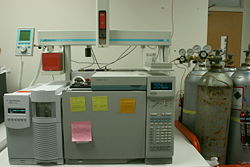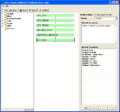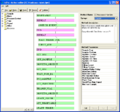SPME
From LEAP
Bpeat (Talk | contribs)
(New page: {{LSApp |name = GC SPME |image = Agilent 6890 GC with 5975C MSD.jpg |type = '''STANDARD''' |id = GCSPME |description = GC SPME }} [[Image:LEAP Logo....)
Newer edit →
Revision as of 22:22, 4 May 2009

| GC SPME |
| Application Type | |
| STANDARD | |
| Application ID | |
| GCSPME | |
| Description | |
| GC SPME |
Contents |
Abstract
A simple and fairly standardized technique of extracting volatile and semi-volatile substances from raw samples in liquid or solid form is headspace analyzes [1]. A sample is placed in a vial that is sealed by a septum and cap and heated in an incubator for a specific time. Once the content of the vial has reached equilibrium a sampled is extracted and injected into the injection port of a GC. LEAP’s specific equipment the CTC COMBI PAL performs all the tasks for this extraction method unattended. For a sequence of samples up to 96 the COMBI PAL will schedule the vials to be in the incubator/agitator for the same amount of time before a precise sample of headspace gas is extracted by a heated syringe system for a subsequent appropriate injection into a GC. Many variables are programmable over a validated range. 1ml, 2.5ml and 5ml syringes and a solvent-less solid phase micro extraction system are the tools that can be mounted in the injection head.
Screenshots
Photos
Some Advantages of Headspace Analysis
- Limited sample preparation
- Improves detection limits
- Reduction in method development times
- Reduction of matrix interference from sample matrix
- Extended life of the GC column
- Reduction of instrument down time
Accessories
Venting with an inert gas before Headspace Vent Tool
Barcode Reading with LEAP Shell software Bar Code Reading
Useful links
Contact LEAP
For additional information about this technique please contact LEAP Technologies for detailed information












